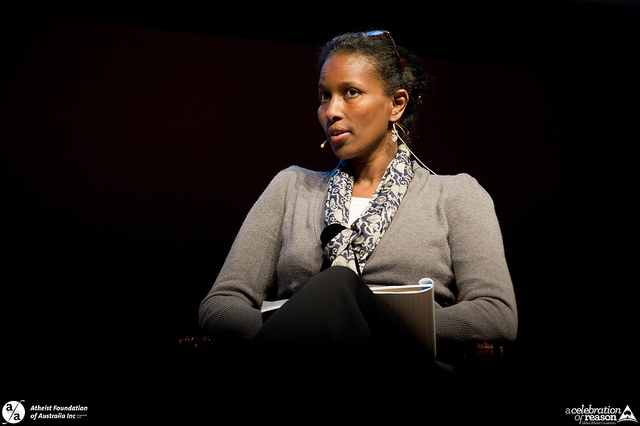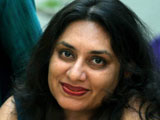Oil Over Fire: Thoughts on Ayaan Hirsi Ali’s Heretic
by Bina Shah / April 9, 2015 / 2 Comments
The widely promoted new book does nothing to move beyond the “us vs. them” binary that has long characterized Western conversations about Islam.

Photo: Rocco Ancora. Creative Commons.
The Somali-born American writer, activist, and politician Ayaan Hirsi Ali is back on the scene with a new book, Heretic: Why Islam Needs a Reformation Now, an anti-Islamic polemic that’s now being reviewed and debated in American media. Meanwhile, Hirsi Ali is making the rounds on television talk shows and radio programs to propagate the ideas in her book, most notably to warn the world that Islam is not a religion of peace, that “we” (the West) are at war with Islam, and that the world should be afraid of a future where Muslims outnumber non-Muslims in many Western countries.

- Pakistan is a country of contradictions – full of promise for growth, modernity and progress, yet shrouded by political, social and cultural issues that undermine its quest for identity and integrity. My bi-monthly column “Pakistan Unveiled” presents stories that showcase the Pakistani struggle for freedom of expression, an end to censorship, and a more open and balanced society.

- Bina Shah is a Karachi-based journalist and fiction writer and has taught writing at the university level. She is the author of four novels and two collections of short stories. She is a columnist for two major English-language newspapers in Pakistan, The Dawn and The Express Tribune, and she has contributed to international newspapers including The Independent, The Guardian, and The International Herald Tribune. She is an alumnus of the International Writers Workshop (IWP 2011).
There couldn’t be a worse time for Hirsi Ali to advertise her opinions on Islam. The Middle East is in the middle of a paroxysm of violence and war, in Syria and Iraq, where Iran, Russia, and Saudi Arabia play power games; in the ever-continuing travails of Palestine; and now in the new conflict between Saudi Arabia and Yemen’s Houthis, which threatens to take on an ugly sectarian tone. The militant group Al Shabab killed 147 Kenyan Christian university students in Garissa, while Boko Haram in Nigeria continues to commit atrocities against Christian civilians there. A complex nuclear deal between Iran and the Western countries has just been engineered in Lausanne, which will bring Iran back into the global community, against the wishes of war hawks in the United States, Saudi Arabia, and Israel.
In short, these are dangerous and delicate times, where the many countries that make up the Muslim world are confronting the demons embedded into their history, politics and society by decades or even centuries of dictatorship and monarchy, aided and emboldened by former colonial powers that benefited greatly from Arab and African autocracy. These demons have morphed and transformed into the many militant Islamist groups that are terrorizing civilians and authorities. Across Muslim nations, both states and communities are scrambling to adjust internal policies, come up with new military strategies to counter terrorism, and address the social, economic and political injustices in their countries that encourage these groups’ popularity.
Ayaan Hirsi Ali places all these conflicts squarely at the feet of the Quran, claiming that the tenets of Islam as written in the holy book are the reason for all of the conflicts in the Middle East, and increasingly in the Western world. Her call for a “Muslim reformation” is long on rhetoric but very short on both substance and practicality, bringing neither clarity nor relief to Muslims and non-Muslims trying to negotiate space with one another in countries where they live together. And Heretic is part of ongoing attempts to polarize Western thinking into a crude, unsophisticated “us vs. them” binary, rather than a nuanced understanding of the lives of Muslims, which is the only way to keep affirming our mutual humanity.
I have not read Heretic so this is not an attempt to review that book, but to explain how Hirsi Ali’s voice is damaging to human relationships at a time when our connections across cultures and nations are at their most fragile. Hirsi Ali and her supporters would likely argue that it is Islam that is causing that damage. But even if Islam were eliminated from the world today, as Hirsi Ali previously advocated (in many previous interviews and articles she has said the only solution is to “crush” it). If Islam is diluted, as her new stance advocates, the world would still be divided between West and East, North and South, developed and developing. The discontents that these divisions engender would not go away with the watering down of Islam, nor would the power struggles, vilification of certain groups, or attempts to seize control of natural resources and territory.
Hirsi Ali herself has agreed that her suggestions for a Muslim Reformation are not likely to be taken seriously by most Muslims. The New York Times review of Heretic quotes her as writing ““it is unrealistic to expect a mass exodus from Islam.” So what was the point of this book, apart from presenting what, in her view, is a defanged and declawed version of a religion that should not exist in the first place? How exactly will this bring peace between cultures that Hirsi Ali already believes are incompatible with each other?
Ayaan Hirsi Ali certainly has the right to put her opinions about Islam in the public arena, and accusations of blasphemy and apostasy serve no purpose here. But she is using her voice to divide and fray relations between people rather than bringing them together on common ground. Perhaps a better book to understanding the real motivations of Muslims around the world is Who Speaks For Islam: What A Billion Muslims Think by John L. Esposito and Dalia Moghahed, who based their book on a groundbreaking Gallup poll of 90 percent of the world’s Muslims. In a time when global tension can only be eased through respect, understanding, and goodwill, this is the book to read to understand what Muslims truly want out of life, rather than have Ayaan Hirsi Ali’s fears projected onto an all-too silenced group.





2 Comments on "Oil Over Fire: Thoughts on Ayaan Hirsi Ali’s Heretic"
Shouldn’t you read her book before lancing into your own polemic? Makes you sound, ironically enough, as angry as Hirsi Ali. Also, isn’t the “best time, worst time” argument mostly used by censors to curtail dialogue and free speech? When is this proverbial “best time” going to be? The answer: never; we just want you to stay quiet and stop rocking the boat.
I heard her interview once… I said to myself… oh my God.. this is the person promoted by media as some kind of intellectual. ….. If you are to write against a particular religion ( read Islam), you are intellectual by default in the eyes of Western Media… their bar is very low, if there is bar at all…She is simply a bitter person , that’s all… there is no tinge of intellectually in her talk at all…